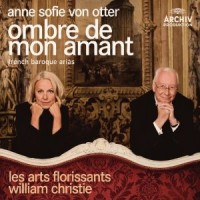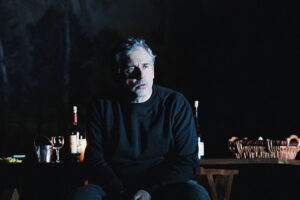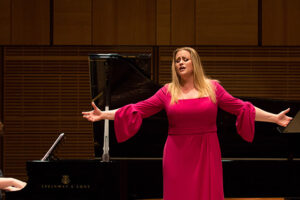
Maybe it’s just me, but every time I listen to well done French baroque music, my imagination flies to the opulent halls of Versailles. I fantasize about being amongst Louis XIV and his cohorts drunk on wine, good food, and better music, enjoying the life of a bon vivant. Few recordings have created this vivid image for me more than the recently released Ombre de Mon Amant
, featuring Anne Sofie von Otter performing with William Christie and his wonderful period ensemble Les Arts Florissants.
It goes without saying that the singing, playing and interpretations are all world-class. Mr. Christie is today’s greatest baroque and period music interpreter, and his handpicked, detail oriented orchestra responds beautifully to the abrupt changes in tempo and emotion in many of these pieces. Ms. Von Otter brings her characteristically versatile mezzo-soprano to this album with a new vigor. She explores everything her voice can to do to illustrate a text without apprehension, and the end result is fantastic.
Also, the French had a peculiar dislike for the castrati so these works were originally written for women, making them far easier to perform in a historically accurate fashion than much of the Italian repertoire from the same era.
French Baroque music offers wonderful expressive possibilities, making it one of the most direct styles of story telling in opera. The freedom to ornament and elaborately focus on the text creates marvelous and unique sounds. A superb example of this is the chanson à danser “Celle qui fait mon tourment”, which begins with Ms. Von Otter solo, and eventually accompanied only by guitar. This short piece illustrates every effect, ornament, and expressive possibility in the human voice, but without seeming at all overdone.
One of the many things I enjoy about French baroque are the jaunty dance tunes that were so fashionable, and indeed necessary, at the time, especially the pieces from Médée. Charpenier’s only tragédie lyrique tells the story of the celebrated sorceress from her forced parting from the Argonaut Jason to her diabolical revenge. Why the demons from the underworld get such fun music is beyond me — maybe they’re having a party down there, but I very much enjoy the happily nasal character singing of the demon chorus, creating a fantastic Greek theater feel to the music.
While the fun music is extremely fun, the French had as well an incredible gift for the melancholy sadness of spurned or lost love. The title track of the album, an air by Michel Lambert, drips with soft-spoken sadness about the shade of a lost lover appearing again at last at the time of death. Ms. Von Otter sings this air in a way that would make a bel canto lover cringe – at times well off the voice and breathy, or leaning into a note with straight tone and gradually introducing vibrato. But when one takes from the equation bel canto — which this music of course antedated — the effect is intimately touching and affecting.
I’ll keep my eyes and ears out for more quality works of this rep, which I certainly hope to see and hear soon.
























Comments